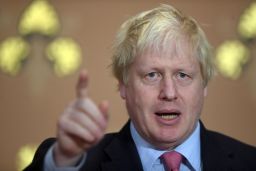How long can she stagger on? Who will the next Prime Minister be? Does anyone else in her party even want the job?
The speculation around Theresa May’s grasp on leadership is unmatched in the recent history of British politics.
You could be forgiven for thinking that leading Britain toward Brexit was a mantle to covet for a Conservative member of Parliament hoping to steer the country toward the romantic, sunlit uplands of independence from Europe.
But no. And while Brexit is May’s poisoned chalice, it was merely passed to her by her predecessor.
The Conservative Party has been in turmoil since at least the 1980s over Europe. Former Prime Minister David Cameron called the EU referendum precisely to settle the question of Britain’s relationship with Europe once and for all and prevent a split in his party.
“It is time for the British people to have their say,” he said in January 2013. “It is time to settle this European question in British politics. I say to the British people: this will be your decision.”
Two years after Britain voted narrowly to leave, the European question is far from settled, and the Conservatives are more divided than ever.
Call for a new vote
May is reeling from a string of resignations, and now the highest-ranking Tory yet – former Cabinet minister Justine Greening – has implored the government to put country before party and hold a second referendum on Brexit.
Greening, a former education secretary, wants a first- and second-preference vote on three options: hard Brexit, soft Brexit, no Brexit. Writing in The Times of London, Greening called May’s plan for Brexit “the worst of both worlds,” explaining that the intractable deadlock meant the decision needed to go back to the people. Both May and the opposition Labour leader Jeremy Corbyn have ruled this out.
So, to steal a quote from “Macbeth,” “What’s done cannot be undone.” Or can it?
Adding to the chorus is prominent Remainer and former Tory attorney general Dominic Grieve, arguing in the Evening Standard newspaper Monday that “we must either work together to get the best deal we can and this needs compromise, or accept that Brexit cannot be implemented and think again about what we are doing.”
Deadlock is nothing new. But the exhortations of Greening for a second referendum, Grieve’s call to think again and a cascade of eight resignations in two weeks suggest that the Prime Minister may have reached a dead end on her Brexit plan, before the EU even gets its say on the matter.
A Cabinet divided

May’s Brexit secretary, David Davis, resigned a week ago Sunday, unable to back her compromise plan. He was followed by foreign secretary Boris Johnson – perhaps the most prominent face of the Leave campaign. Davis has said he will not be making a resignation speech but there has been no such assurance from Johnson. The tradition fills Tory members with dread – remembering the resignation speech of Geoffrey Howe that ultimately destroyed then-Prime Minister Margaret Thatcher. Boris may not go so gently into the back benches.
The fratricidal tendencies of the Tory party are now out in full force. The specter of a confidence vote is never far away: hard-line Brexiteers now say they have enough supporting MPs to trigger the internal political process that could lead to May’s ouster through such a vote. While it is plausible they have the 48 signatures needed, the understanding is that May would probably still win. Under Tory party rules, she could not be challenged again for a year.
Embodying Newton’s third law
Still, today the vultures are circling on Tory WhatsApp groups to mount a Commons rebellion on the Brexit Customs Union bill, which could scupper the Prime Minister’s proposed compromise.
Theresa May is the textbook study for Newton’s third law. Every time she makes a modicum of progress, it backfires to the point of inertia. That’s because delivering Brexit in a hung Parliament was going to make navigating the inherent contradictions next to impossible: Deliver Brexit, preserve the union. Do a deal the EU will approve, and one that Parliament will pass. Keep enough Brexiteers satisfied, while staving off Tory rebellions.
Theresa May is stuck in the middle with no one. It’s a good thing for her right now that despite the ever present threat of a leadership contest, no one else seems in a rush to take her place.


